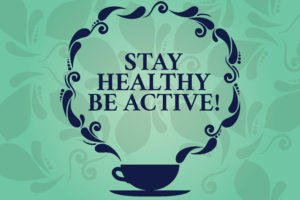Calling all Male Beneficiaries - WE NEED YOU!
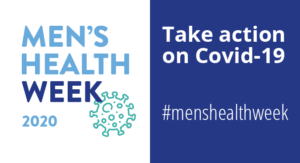 Men's Health Week 15 - 21 June 2020
Men's Health Week 15 - 21 June 2020
Since 2016 we have been carrying out Holistic Needs Assessments for all our beneficiaries and it is noticeable that some of our male beneficiaries are less comfortable talking about, or are paying less attention to, their health than the average woman. Our information here discusses key issues and what men can do to help themselves.
Also, to coincide with Men's Health week, we're highlighting our focussed initiatives for male beneficiaries:
Find help and support through our Low Mood Improvement programme
Men's Health
Compared to women, men are more likely to
- drink alcohol
- use tobacco
- not see a doctor for regular check-ups
- suffer in silence from emotional issues, such as depression or loneliness.
The Men’s Health Forum is having their annual “Men’s Health Awareness Week”. The main theme for this year’s event is Covid-19. However the site also has lots of useful information looking at the main health issues affecting men.
You can see the full campaign details on the Men's Health Forum website
Have an NHS health check
It is important that men consider their health and we urge you all to have a NHS health check.
The NHS offer free health checks for men aged 40-74. It does not take long and it could help you to manage your health for the future.
What is an NHS health check?
It's basically a free midlife MOT from NHS England. It can help spot early signs of heart disease, diabetes, kidney disease, stroke and other health problems.
What happens during the check?
It takes about 20 minutes. The health professional - usually a nurse - will ask you some simple questions, measure and weigh you, take your blood pressure and possibly take some blood. Based on this, they will be able to give you an idea of your risk of several serious diseases: heart disease, stroke, kidney disease and type 2 diabetes.
If you have problems with having your blood pressure monitored or blood taken, let us know that you want to have health check and we can liaise with your GP surgery to advise them on how to do this effectively. For example by sharing this link to our Taking Blood Pressure In The Leg information or by sending our Vein Viewer.
They'll then give you personalised advice to reduce your risk.
If you prefer, you can ask specifically to see a man or a woman but it's not really necessary. The questions are very easy and not embarrassing and you won't have to take any clothing off.
For further information on the Health Checks the Men’s Health Forum website has more details
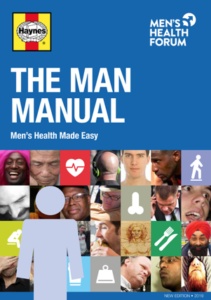 The Man Manual
The Man Manual
There is also a manual especially designed for men. The manual includes every man’s personal Tool-kit and answers a lot of frequently asked questions important for men.
The manual explains:
- How to be good to your heart
- How to get active
- How to handle the ups and downs
Buy a copy of the Man Manual from Men's Health Forum
Join our own ‘Men’s Health Forum’

On Thursday 18 June our Medical Adviser, Susan Brennan, will be hosting an on-line forum with male beneficiaries to discuss health issues. The forum will take place via Zoom and it is very easy to take part – you can be active online or submit questions anonymously - just contact Annabelle Blackham at Annabelle.blackham@thalidomidetrust or 01480 474074.
It would be useful to submit your questions to Annabelle beforehand so Susan is able to be sure she has all the information to answer these for you.
Whatever your issue is or how embarrassing it may sound, we want to hear from you. It’s important to talk about your health so you get the right support you need. Anonymity can be assured.
Stories from our beneficiaries
Neal Merry helps train athletes and take pleasure from being in the fresh air. He likes keeping himself fit. Please read Neal’s story to see what motivates him.
Nicholas Carapanagiotu enjoys scuba diving and it has taken him around the globe and improved his fitness too. Nick says that “Diving has improved my health and fitness no end.” Read Nick's scuba diving story to find out how it has helped him.
Plus, read Nick's story on how he has been able to take up bike riding to help keep fit during the coronavirus epidemic.
Mat Fraser has always kept himself fit with martial arts but is finding that that as he's getting older, he needs to focus on strength and flexibility exercises to maintain mobility and prevent pain.
Watch Mat's video as he talks about and demonstrates the exercise he finds helpful
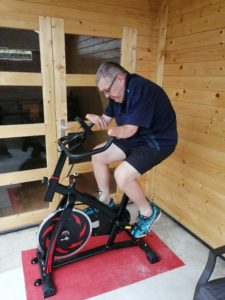

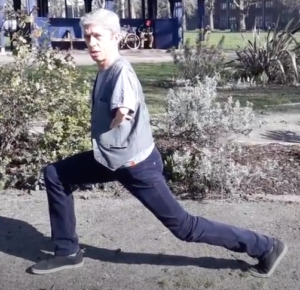
Do not suffer in silence
 More than ever due to Covid-19, beneficiaries are having to cope with a whole new lifestyle of being at home and restricted on where you can go and what you can do. At times like these our mental wellbeing will be affected and we know, from experience that a lot of our male beneficiaries will suffer in silence rather than speak to anyone about how they are feeling. However, by speaking to someone about it is the way to improve your health and wellbeing.
More than ever due to Covid-19, beneficiaries are having to cope with a whole new lifestyle of being at home and restricted on where you can go and what you can do. At times like these our mental wellbeing will be affected and we know, from experience that a lot of our male beneficiaries will suffer in silence rather than speak to anyone about how they are feeling. However, by speaking to someone about it is the way to improve your health and wellbeing.
The important thing is to stay connected to people and the following give some ideas on how to do this:
- Talk to someone rather than texting or emailing
- Ask someone something about themselves that you don’t know
- Contact someone you have not spoken to for a long time
- Attend a beneficiary coffee meeting by zoom
- Ask to speak to a TalkTogether volunteer
- Talk to someone at our Health & Wellbeing team.
- Ask to speak to a volunteer, (we have 4 male volunteers if this is your preference).
- Become a volunteer – speak with Annabelle on 01480 474074 or email [email protected] about our volunteer opportunities.
Read about the benefits that our male volunteers have found through helping other beneficiaries
Improving low mood
 Last year we piloted a project to help and support beneficiaries living with low mood.
Last year we piloted a project to help and support beneficiaries living with low mood.
For some time now we have been aware that a significant proportion of our beneficiaries are experiencing poor mental wellbeing, including low mood, depression and anxiety. Information from HNAs indicate a high prevalence of low mood across the beneficiary population. The Trust worked with the University of York and introduced a programme called ‘Low Mood Improvement for Thalidomide survivors’ (LIfTS) to support beneficiaries by training beneficiary volunteers to act as peer supporters. This involved a weekly telephone call from a volunteer to a beneficiary, spread over six weeks. The sessions included the volunteer and beneficiaries completing a workbook. The findings from the initial project shown that there were marked improvements in reducing low mood.
We want to continue to offer this support and if you feel that you would like to speak to a trained volunteer or staff member about your low mood, please contact the Health & Wellbeing team on 01480 474074 or email [email protected]
Help to stop smoking
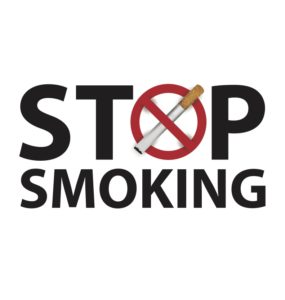 Stopping smoking is the single biggest thing you can do to protect your health. It's never too late to benefit from stopping smoking. It can add years to your life as well as greatly improving your chances of a disease-free, mobile, happier old age.
Stopping smoking is the single biggest thing you can do to protect your health. It's never too late to benefit from stopping smoking. It can add years to your life as well as greatly improving your chances of a disease-free, mobile, happier old age.
We are looking for a couple of beneficiaries to receive support from the Trust H&W team to quit smoking and to act as a case study to help other beneficiaries. If you are keen to give up and interested in our support please contact the team on 01480 474074 or email [email protected]
If you want to stop smoking, you can make small changes to your lifestyle that may help you resist the temptation to light up:
- Think positive
- Make a plan to quit smoking
- Make a promise, set a date and stick to it
- Consider your diet
- Get some support to stop smoking. Try nicotine replacement products such as patches or gum. There are also local stop smoking services which can increase your chance of quitting by up to 4 times. (Some of these may be currently not available due to the restriction of Covid-19). The NHS has a list of services to help you stop smoking.
For more information on how to stop smoking see the self helps tips from the NHS.

